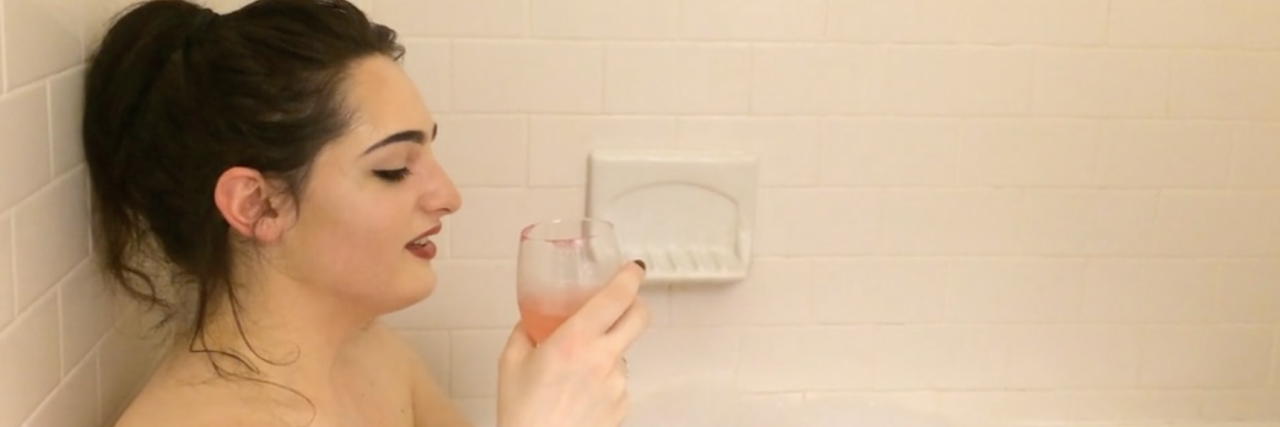I’m one of the busiest people I know, and technically, I don’t even have a full-time job – life is funny that way. I’m getting a master’s degree at New York University’s (NYU) Gallatin School of Individualized Study, I’m the president of the Greater New York Mensa board of directors, and I model when the field will let me, for both photography and figure drawing. I keep up with my friends, socialize often, spend hours at the library, at restaurants and coffee shops. I go to the gym, go to bars and parties. I read, I write, answer emails and take phone calls. I do so much I can barely list it all from memory in reflection. And I do it all with lupus. Such an exhausting, often times bewildering and time-consuming illness. Or at least it should be – right?
Looking back on the sheer amount of activities I engage in, much less the intensity and mental energy each requires, it’s safe to say I’m in remission. The amount of time I’ve spent at my rheumatologist’s office over the past year has been less than the time I waste online shopping for bridesmaid dresses at the graduate student lounge in Bobst Library, and the flares I’ve had barely amount to the hours I spend getting my eyebrows threaded. As of this year I’m no longer on any unnecessarily complicated yet simultaneously broad-spectrum autoimmune treatments with a name that sounds vaguely like a Swedish woman sneezing. Just some painkillers, over-the-counter aids, and of course the nightly cup of chamomile tea. So I don’t really go to the doctor, I’m not really on medication, and to cap it all off, my blood tests are consistently and irritatingly normal, or if not normal, disconcertingly mundane. It sounds like a perfect equation for remission. A normal, happy, healthy existence. But it’s not that easy.
My rheumatologist has never labeled me as “in remission,” which I am, at least at the moment. I am quite thankful for this. And even if my medications aren’t consistent, my symptoms always are. But you learn to live with them, as sad as it sounds, and develop a rhythm that makes reshuffling your schedule around their flares seem normal, a tale too familiar to many of us too busy to be sick. The main culprit, that one special symptom that may remain with me until a cure for lupus do us part, is known formally as chronic pain, but her friends just call her “that relentless bitch” – her sister, fatigue, is always close behind.
There’s not a day that goes by that something doesn’t hurt, something isn’t swollen, or something doesn’t snap, crackle and pop when I move but an inch. Between peripheral neuropathy, costocondritis, arthritis and all of the other flavors of discomfort an auto-immune disease stirs into the tasty stew aptly named “Everyone’s Own Experience,” chronic pain is an inescapable force. It dominates a patient’s hobbies, wishes, their schedule and plans, goes against their will, and has to be translated into sloppy, simplistic metaphors like “spoons,” or worse, misunderstood as excuses to remain introverted. Sure, we’ve all had days where we’d rather stay in bed than fulfill that commitment we’ve been dreading – hell, so do healthy people. But why? “You’re so healthy, Sara, you look so healthy,” I hear from well-meaning acquaintances, “I didn’t think you were that sick. I mean, you don’t look sick.” You’re right, actually. But contrary to those in remission, I do feel sick. Or at least that’s the way it’s supposed to be.
Remission, even if it is achieved and labeled as such, isn’t often the end-all, be-all it’s touted as; it might be a road happily traveled, seeing as your health doesn’t negatively progress in remission, but it certainly isn’t the proverbial rose garden that the proverbial advertisements sell us. A recent study across five European countries about lupus patients and their journeys in remission indicated that though 700 patients report being in remission, as much as 25 percent of patients reported experiencing joint pain as opposed to 46 percent out of 450 patients not in remission. As for fatigue, the ratio was 22 percent to 39 percent, respectively. Some even experience kidney involvement, intermittent fevers, and even infections.
It isn’t as cut and dry as some might think to be in remission, and though your disease may not be spiraling out of control, a disorder can still have a profound impact on one’s lifestyle. It’s a misleading label: too healthy to be really sick, but too sick to be cured completely. And those of us without the label, those of us who don’t look sick enough to be sick, but aren’t healthy enough to be in remission, are a category of our own. Living with a chronic illness, especially prior to having a concrete diagnosis, from inconsistent blood tests to obscure body aches and new physical oddities popping up each day, is a kind of purgatory on its own. And many also exist in a space between true illness and true remission.
So yes, I may not have a shiny new kidney like some adorable, button-nosed pop stars (I’m looking at you, Selena Gomez), or frequent the NYU Langone emergency room so often that the nurses know my name – but if there’s anything I’ve learned in the past few months, it’s that I’m certainly not healthy. The strange, grey area between health and illness is not lost on me; with wing-tipped eyeliner, black suede booties and my bodega coffee, on a busy New York street as I exasperatedly vent to my future vice president – no one can tell I’ve had two biopsies in October, five doctor’s appointments, and have an upcoming MRI next week. Maybe I’m trying to convince myself I’m in remission. Or maybe I’m trying to convince others that if I were, it isn’t as easy as it looks. It’s certainly a label that needs restructuring either way.
Photo by Mark Burger

